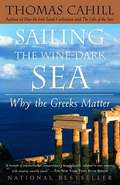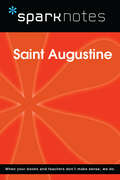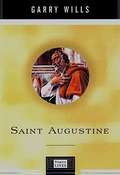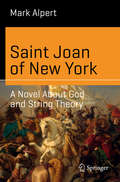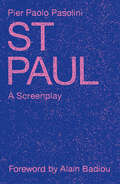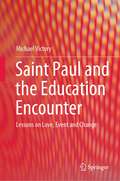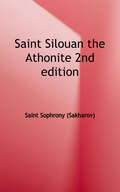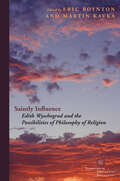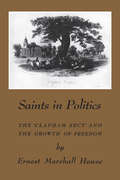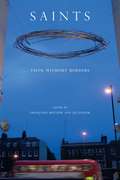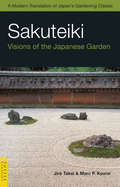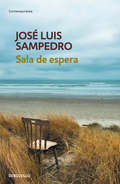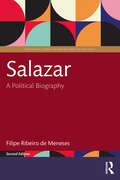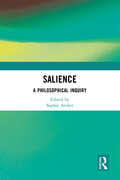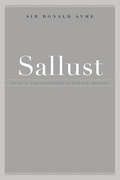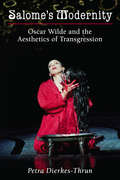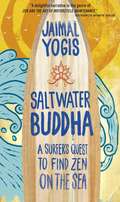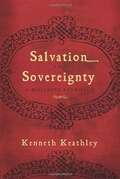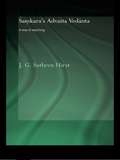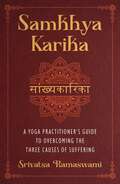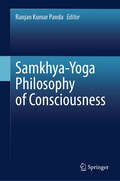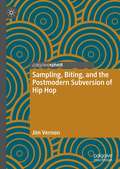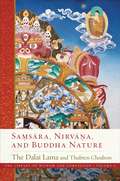- Table View
- List View
Sailing the Wine-Dark Sea: Why the Greeks Matter (The Hinges of History)
by Thomas CahillIn Sailing the Wine-Dark Sea, his fourth volume to explore "the hinges of history," Thomas Cahill escorts the reader on another entertaining--and historically unassailable--journey through the landmarks of art and bloodshed that defined Greek culture nearly three millennia ago.In the city-states of Athens and Sparta and throughout the Greek islands, honors could be won in making love and war, and lives were rife with contradictions. By developing the alphabet, the Greeks empowered the reader, demystified experience, and opened the way for civil discussion and experimentation--yet they kept slaves. The glorious verses of the Iliad recount a conflict in which rage and outrage spur men to action and suggest that their "bellicose society of gleaming metals and rattling weapons" is not so very distant from more recent campaigns of "shock and awe." And, centuries before Zorba, Greece was a land where music, dance, and freely flowing wine were essential to the high life. Granting equal time to the sacred and the profane, Cahill rivets our attention to the legacies of an ancient and enduring worldview.From the Trade Paperback edition.
Saint Augustine (SparkNotes Philosophy Guide)
by SparkNotesSaint Augustine (SparkNotes Philosophy Guide) Making the reading experience fun! SparkNotes Philosophy Guides are one-stop guides to the great works of philosophy–masterpieces that stand at the foundations of Western thought. Inside each Philosophy Guide you&’ll find insightful overviews of great philosophical works of the Western world.
Saint Augustine: A Life
by Garry WillsPulitzer Prize winner Garry Wills brings the same fresh scholarship, lively prose, and critical appreciation that characterize his well-known books on religion and American history to this outstanding biography of one of the most influential Christian philosophers. <P><P> Saint Augustine follows its subject from his youth in fourth-century Africa to his conversion and subsequent development as a theologian. It challenges the widely held misconceptions about Augustine's sexual excesses and shows how, in embracing classical philosophy, Augustine managed to enlist "pagan authors" in the defense of Christianity. The result is a biography that makes a spiritual ancestor feel like our contemporary.
Saint Joan of New York: A Novel About God and String Theory (Science and Fiction)
by Mark AlpertSAINT JOAN OF NEW YORK is a novel about a math prodigy who becomes obsessed with discovering the Theory of Everything. Joan Cooper, a 17-year-old genius traumatized by the death of her older sister, tries to rebuild her shattered world by studying string theory and the efforts to unify the laws of physics. But as she tackles the complex equations, she falls prey to disturbing visions of a divine being who wants to help her unveil the universe’s mathematical design. Joan must enter the battle between science and religion, fighting for her sanity and a new understanding of the cosmos.
Saint Paul
by Pier Paolo PasoliniPresented here for the first time in English is a remarkable screenplay about the apostle Paul by Pier Paolo Pasolini, legendary filmmaker, novelist, poet, and radical intellectual activist. Written between the appearance of his renowned film Teorema and the shocking, controversial Salò, or the 120 Days of Sodom, St Paul was deemed too risky for investors. At once a political intervention and cinematic breakthrough, the script forces a revolutionary transformation on the contemporary legacy of Paul. In Pasolini's kaleidoscope, we encounter fascistic movements, resistance fighters, and faltering revolutions, each of which reflects on aspects of the Pauline teachings. From Jerusalem to Wall Street and Greenwich Village, from the rise of SS troops to the death of Martin Luther King, Jr, here--as Alain Badiou writes in the foreword--'Paul's text crosses all these circumstances intact, as if it had foreseen them all'. This is a key addition to the growing debate around St Paul and to the proliferation of literature centred on the current turn to religion in philosophy and critical theory, which embraces contemporary figures such as Alain Badiou, Slavoj i ek and Giorgio Agamben.From the Hardcover edition.
Saint Paul and the Education Encounter: Lessons on Love, Event and Change
by Michael VictoryThis book connects the Biblical Paul’s work as an educator with the revival of interest in Paul’s impact on contemporary social and cultural experience, sometimes referred to as ‘Paul’s new moment’. It presents Paul's letters as being the testament of an educator who brought a radical emancipatory approach to the communities with whom he lived and worked. The book draws on history, philosophy, New Testament studies, and social theory to present the case for Paul as the initiator of a pedagogy of the event. This book explores the concept of a pedagogy of the event, and provides a case study of success in its implementation.
Saint Silouan the Athonite
by Saint SophronyIn the autumn of 1892 a young Russian peasant named Simeon from the province of Tambov was drawn to that ancient repository of Orthodox spirituality, Mt Athos. He had done his military service and now came to the Russian Monastery of St Panteleimon to embark on long years of spiritual combat lasting until his death in 1938. Although he was unlearned and ignorant in the ordinary sense, tireless inner strivings gave him authentic personal experience of God identical to that of many of the ancient Desert Fathers. The first part of this book is a remarkable account of St Silouan's life, personality and teaching by his spiritual disciple Saint Sophrony. St Sophrony went to Mt Athos in 1925 and there at the Monastery of St Panteleimon became an assistant to Staretz Silouan. Part two comprises the writings of Silouan, originally penciled in laborious, unformed characters on odd scraps of paper. The Lord said, "Every one that is of the truth hears my voice" (John 18:37) and according to St Sophrony, "these words are applicable to Staretz Silouan's notes ... [That] whoever has received from God the mind and wisdom to know him will be aware in the Staretz' words of the breath of the Holy Spirit." In 1988, Staretz Silouan was placed in the canon of saints by the Ecumenical Patriarchate. This is a new edition that reflects the canonization of the author to sainthood.
Saintly Influence: Edith Wyschogrod and the Possibilities of Philosophy of Religion (Perspectives in Continental Philosophy)
by John D. CaputoSince the publication of her first book, Emmanuel Levinas: The Problem of Ethical Metaphysics, in 1974-the first book about Levinas published in English-Edith Wyschogrod has been at the forefront of the fields of Continental philosophy and philosophy of religion. Her work has crossed many disciplinary boundaries, making peregrinations from phenomenology and moral philosophy to historiography, the history of religions (both Western and non-Western), aesthetics, and the philosophy of biology. In all of these discourses, she has sought to cultivate an awareness of how the self is situated and influenced, as well as the ways in which a self can influence others.In this volume, twelve scholars examine and display the influence of Wyschogrod's work in essays that take up the thematics of influence in a variety of contexts: Christian theology, the saintly behavior of the villagers of Le Chambon sur Lignon, the texts of the medieval Jewish mystic Abraham Abulafia, the philosophies of Levinas, Derrida, and Benjamin, the practice of intellectual history, the cultural memory of the New Testament, and pedagogy.In response, Wyschogrod shows how her interlocutors have brought to light her multiple authorial personae and have thus marked the ambiguity of selfhood, its position at the nexus of being influenced by and influencing others.
Saints in Politics: The 'Clapham Sect' and the Growth of Freedom
by Enrest HowseThis book gives a picture of an important religious reform group in action during the period of the French Revolution, Napoleon, and the Industrial Revolution. In this period of injustice and misery the British ruling classes, frightened by the excesses of the French Revolution, determined, at a time when economic life was changing at a rate unequalled for centuries, that existing laws and institutions should not change. And yet from this time came the moral, philanthropic, and religious ideas which transformed later England and resulted in the abolition of the slave trade, educational reforms in India, emancipation of Negroes in the British possessions, popular education and the growth of Sunday schools in England, reform of the whole penal and judicial system, industrial and parliamentary reform, and a new spirit of religious tolerance and philanthropy. The moving force in human progress at this epoch was a "brotherhood of Christian politicians" lampooned in Parliament, during their lifetime, as "the Saints" and remembered in history as "The Clapham Sect," led by Wilberforce. Dr. Howse brings together for the first time in this book material on all the activities of the Sect. He gives us sketches of members of the Set, their life as a group at home, and in the midst of their campaigns, where novel methods and ceaseless labour brought results out of all proportion to the size of the group.
Saints: Faith without Borders (A\critical Inquiry Book Ser.)
by Francoise Meltzer and Jas ElsnerWhile the modern world has largely dismissed the figure of the saint as a throwback, we remain fascinated by excess, marginality, transgression, and porous subjectivity—categories that define the saint. In this collection, Françoise Meltzer and Jas Elsner bring together top scholars from across the humanities to reconsider our denial of saintliness and examine how modernity returns to the lure of saintly grace, energy, and charisma.Addressing such problems as how saints are made, the use of saints by political and secular orders, and how holiness is personified, Saints takes us on a photo tour of Graceland and the cult of Elvis and explores the changing political takes on Joan of Arc in France. It shows us the self-fashioning of culture through the reevaluation of saints in late-antique Judaism and Counter-Reformation Rome, and it questions the political intent of underlying claims to spiritual attainment of a Muslim sheikh in Morocco and of Sephardism in Israel. Populated with the likes of Francis of Assisi, Teresa of Avila, and Padre Pio, this book is a fascinating inquiry into the status of saints in the modern world.
Sakuteiki
by Marc P. Keane Jiro TakeiThe Sakuteiki, or "Records of Garden Making," was written nearly one thousand years ago. It is the oldest existing text on Japanese gardening-or any kind of gardening—in the world. In this edition of the Sakuteiki the authors provide both an English-language translation of this classic work and an introduction to the cultural and historical context that led to the development of Japanese gardening.
Sala de espera
by José Luis SampedroLa obra póstuma de José Luis Sampedro. «La muerte me lleva de la mano, pero se está portando bien porque me está dejando pensar.» Los ríos como metáfora de la vida fueron una constante en la obra de Sampedro, hasta el punto de trascender la literatura y hacerse realidad cuando conoció a Olga Lucas. Fue su historia de amor lo que les inspiró a escribir sobre sus diez primeros años de vida juntos. Lo hacían cada uno por su lado y a hurtadillas para preservar la sorpresa cuando llegara el momento de compartirlos. Como si se tratara de un mensaje dentro de una botella, Olga encontró el texto de José Luis tras su fallecimiento y decidió unirlo al suyo. El resultado: este relato conmovedor de dos vidas diametralmente distintas, unidas para siempre a orillas del río Jalón. La segunda parte, «Sala de Espera», recoge el sentimiento de rebelión y lúcida rabia con el que vivió los últimos años. A caballo entre la autobiografía y el ensayo, el libro incluye además material inédito de su archivo personal -fotografías, anotaciones manuscritas- que hacen de él un documento de excepcional valor y muestran la emoción que Sampedro ponía a todo lo que hacía. La obra póstuma de uno de nuestros escritores más añorados, un hombre íntegro que estuvo pensando, leyendo y afanándose en escribir hasta el último suspiro. La crítica ha dicho...«Es aquí donde el escritor esboza "sus verdades", donde se replantea el sentido último de la nueva barbarie, donde busca aportar algo propio al proceso de desescombro que vivimos.»Elsa Fernández-Santos, El País
Salazar: A Political Biography (Routledge Studies in Fascism and the Far Right)
by Filipe Ribeiro de MenesesSalazar: A Political Biography is the definitive biography of the longstanding Portuguese dictator. António de Oliveira Salazar entered the government of Portugal when Herbert Hoover was president and ended his political career at the end of the Johnson administration. He remained in power for forty years (1928–1968), one of the longest tenures in modern history. Unlike the other ‘great dictators’ of the twentieth century, Salazar, an academic, immersed himself in the minutiae of government and administration, maintaining a prodigious work rate until illness forced his retirement. He successfully managed his country’s finances despite the impact of the Great Depression, imposing a harsh policy of austerity. He then preserved Portugal’s neutrality during the Second World War, ultimately favouring Great Britain and the United States. But Salazar was at heart an extremely conservative, even reactionary statesman. He relied on secrecy and a police state to maintain the order which, he believed, was necessary to control progress. Rejecting the anti-colonialist movements in Asia and Africa, he plunged Portugal into a series of wars in Africa it could ill afford. Fully revised and updated throughout, this remains the authoritative biography of a key Portuguese political leader who was a significant presence in twentieth-century politics. This book will be of interest to historians of the far right, international diplomacy and Portugal.
Salience: A Philosophical Inquiry
by Sophie ArcherSalience is both central to human life and relatively underexplored as a philosophical topic. Whether it bothers you that the picture on your wall isn’t straight, whose advice you should take, or whether you notice the homeless person at your feet as you squeeze your way down the street: these are all a function of salience. Salience is clearly of significance for a broad range of philosophical sub-disciplines, but what precisely is it? This collection addresses this neglected question by considering the role of salience in a wide variety of areas: epistemology; philosophy of perception; philosophy of psychology; practical reason; feminist philosophy; and aesthetics. All 13 chapters have been specially commissioned for this volume, and are written by an international team of leading names in the field. Salience: A Philosophical Inquiry is essential reading for students and researchers in epistemology, philosophy of mind and psychology, ethics, and metaphysics. It will also be of interest to those in related subjects such as politics, law, and sociology.
Sallust (Sather Classical Lectures #33)
by Ronald SymeWith this classic book, Sir Ronald Syme became the first historian of the twentieth century to place Sallust—whom Tacitus called the most brilliant Roman historian—in his social, political, and literary context. Scholars had considered Sallust to be a mere political hack or pamphleteer, but Syme's text makes important connections between the politics of the Republic and the literary achievement of the author to show Sallust as a historian unbiased by partisanship. In a new foreword, Ronald Mellor delivers one of the most thorough biographical essays of Sir Ronald Syme in English. He both places the book in the context of Syme's other works and details the progression of Sallustian studies since and as a result of Syme's work.
Salome's Modernity: Oscar Wilde and the Aesthetics of Transgression
by Petra Dierkes-Thrun"Salome's Modernityis a first-class piece of scholarship---at once learned, sharply focused, and beautifully, indeed, entertainingly written. Above all, it is a significant contribution to modernist studies, for it takes a number of themes that appear in the various writings about Salome to show precisely how the various authors, performers and film-makers utilized and rethought these themes for their own times. " ---Herbert S. Lindenberger, Stanford University "Salome's Modernityis intellectually powerful, truly informative, and engagingly written. No other book rivals it in scope when it comes to placing Wilde's play in a cultural and literary genealogy that links memorable works of poetry, fiction, drama, opera, and film. " ---Joseph Bristow, UCLA Oscar Wilde's 1891 symbolist tragedy Salomé has had a rich afterlife in literature, opera, dance, film, and popular culture. Salome's Modernity: Oscar Wilde and the Aesthetics of Transgressionis the first comprehensive scholarly exploration of that extraordinary resonance that persists to the present. Petra Dierkes-Thrun positions Wilde as a founding figure of modernism and Salomé as a key text in modern culture's preoccupation with erotic and aesthetic transgression, arguing that Wilde's Salomé marks a major turning point from a dominant traditional cultural, moral, and religious outlook to a utopian aesthetic of erotic and artistic transgression. Wilde and Salomé are seen to represent a bridge linking the philosophical and artistic projects of writers such as Mallarmé, Pater, and Nietzsche to modernist and postmodernist literature and philosophy and our contemporary culture. Dierkes-Thrun addresses subsequent representations of Salome in a wide range of artistic productions of both high and popular culture through the works of Richard Strauss, Maud Allan, Alla Nazimova, Ken Russell, Suri Krishnamma, Robert Altman, Tom Robbins, and Nick Cave, among others. Jacket illustration: Maria Ewing in Richard Strauss's Salome, Pittsburgh Opera, 2001, © Suellen Fitzsimmons.
Saltwater Buddha
by Jaimal YogisFed up with teenage life in the suburbs, Jaimal Yogis ran off to Hawaii with little more than a copy of Hermann Hesse's Siddhartha and enough cash for a surfboard. His journey is a coming-of-age saga that takes him from communes to monasteries, from the warm Pacific to the icy New York shore. Equal parts spiritual memoir and surfer's tale, this is a chronicle of finding meditative focus in the barrel of a wave and eternal truth in the great salty blue.
Salvation and Sovereignty: A Molinist Approach
by Kenneth KeathleyIn Salvation and Sovereignty, Kenneth Keathley asks, “What shall a Christian do who is convinced of certain central tenets of Calvinism but not its corollaries?” He then writes, “I see salvation as a sovereign work of grace but suspect that the usual Calvinist understanding of sovereignty (that God is the cause of all things) is not sustained by the biblical witness as a whole.” <p><p>Aiming to resolve this matter, the author argues that just three of Calvinism’s five TULIP points can be defended scripturally and instead builds on the ROSES acronym first presented by Timothy George (Radical depravity, Overcoming grace, Sovereign election, Eternal life, Singular redemption). In relation, Keathley looks at salvation and sovereignty through the lens of Molinism, a doctrine named after Luis Molina (1535-1600) that is based on a strong notion of God’s control and an equally firm affirmation of human freedom.
Samajik Karar: सामाजिक करार
by Vasant Bhagwant Karnikझ्यां-झ्याक रूसो लिखित (SOCIAL CONTRACT) या ग्रंथाचा मराठी अनुवाद “सामाजिक करार” हे पुस्तक धार्मिक आणि भौतिक दोन्ही सत्ताधाऱ्यांना अधिक आक्षेपार्ह वाटले. सामाजिक कराराची कल्पना मान्य केली म्हणजे राजांच्या दैवी अधिकाराला स्थानच उरत नाही; राजसत्तेचा नैतिक पाया नष्ट होतो. म्हणून फ्रेंच राज्यकर्त्यांना ते पुस्तक फार भीतीदायक वाटले. पुस्तकाच्या वाचनामुळे लोकांच्या मनात क्रांतीच्या कल्पना स्फुरतील आणि बंडाचा वणवा पेटेल अशी त्यांना धास्ती वाटली. फ्रेंच राज्यकर्त्यांची ही धास्ती खोटी ठरली नाही. १७८९ साली फ्रेंच राज्यक्रांतीचा वडवानल पेटला तेव्हा क्रांतिकारकांच्या तोंडी होते ते रूसाचे नाव आणि त्यांची प्रेरकशक्ती होती ती त्याच्या सामाजिक करार या पुस्तकातील तत्त्वे व घोषणा! फ्रेंच राज्यक्रांतीच पाया जो घातला तो बुद्धिवादी विद्वानांनी घडवून आणलेल्या वैचारिक क्रांतीने; परंतु प्रत्यक्ष क्रांतीच्या दिवसात क्रांतिकारकांच्या मनावर अधिक पगडा होता तो रूसोच्या विचारांचा आणि त्याच्या मनोवृत्तीचा. क्रांतीच्या संगराच्या वेळी विवेकशील शुद्ध बुद्धीपेक्षा लोकांना हवी असते भावनोत्कट क्रियाशीलता. रूसोची मदार होती बुद्धीपेक्षा भावनेवर. त्यामुळे राज्यक्रांतीवर त्याचा अधिक प्रभाव पडला आणि क्रांतीचा अग्रदूत म्हणून त्याची जगभर ख्याती झाली.
Samkara's Advaita Vedanta: A Way of Teaching (Routledge Hindu Studies Series)
by Jacqueline G. HirstSamkara (c.700 CE) has been regarded by many as the most authoritative Hindu thinker of all time. A great Indian Vedantin brahmin, Samkara was primarily a commentator on the sacred texts of the Vedas and a teacher in the Advaitin teaching line. This book serves as an introduction to Samkara's thought which takes this as a central theme. The author develops an innovative approach based on Samkara's ways of interpreting sacred texts and creatively examines the profound interrelationship between sacred text, content and method in Samkara's thought. The main focus of the book is on Samkara's teaching method. This method is, for Samkara, based on the Upanishads' own; it is to be employed by Advaitin teachers to draw pupils skilfully towards that realisation which is beyond all words. Consequently, this book will be of interest not only to students and scholars of Indian philosophy, but to all those interested in the relation between language and that which is held to transcend it.
Samkhya Karika: A Yoga Practitioner's Guide to Overcoming the Three Causes of Suffering
by Srivatsa Ramaswami• Explores the meaning of all 72 verses of the 4th-century Sanskrit text Samkhya Karika word by word, providing helpful explanations and annotations to aid your understanding• Reveals how Samkhya Karika explains the three duhkhas, or causes of suffering, and how to deal with them to reach a state of freedom from pain and suffering• Shows how Samkhya Karika explains the origin and evolution of the universe and how it identifies the true nature of the Self, the Atman, as unvarying consciousness distinct from the body-mind complexAlong with Yoga and Vedanta, Samkhya is one of the three schools of Vedic philosophy that teach the individual how to break free from the cycles of death and rebirth. Samkhya Karika is the earliest surviving text on Samkhya, a brilliant masterpiece written by fourth-century Indian poet and philosopher Ishvarakrishna, who was considered to be an avatar of the Classical Sanskrit poet Kalidasa.Presenting a translation of Samkhya Karika from the original Sanskrit along with detailed commentary, Srivatsa Ramaswami explores the meaning of all 72 slokas (verses) word by word, providing helpful explanations and annotations to aid in your understanding. He shows how Samkhya philosophy explains the origin and evolution of the universe and how it identifies the true nature of the Self as unvarying consciousness, distinct from the empirical body-mind complex. He reveals how Samkhya Karika explains the three duhkhas, or causes of suffering, and how to deal with them to reach the goal of Samkhya: kaivalya, a state of deep contemplation where one is unafflicted by pain and eternally free from the cycle of samsara.Providing a user-friendly guide to Samkhya for yoga practitioners and students of yoga philosophy, this book also shares insightful teachings from the author&’s teacher, the legendary Sri Krishnamacharya, hailed as "the father of modern yoga."
Samkhya-Yoga Philosophy of Consciousness
by Ranjan Kumar PandaThis book exclusively deals with the study of consciousness in Samkhya-Yoga Philosophy. Samkhya-Yoga is two allied philosophical systems in which consciousness is the focal point of discussion. The book investigates consciousness from metaphysical, epistemological and ethical or normative perspectives. Concepts such as Duhkha (suffering), Purusa (consciousness), Chitta (self/the mental), chittavrti (mental modification), Prakrti and Trigunas (nature and its attributes) are critically discussed to reconstruct the metaphysics of consciousness. All the chapters have contemporary relevance as they delve into the nature of causation and provide an all-inclusive viewpoint of consciousness by emphasizing its normative perspective. The contributions in the book are from eminent scholars working in the field of consciousness and other related topics such as cognition, mind, causality, knowledge and liberation. The book provides a comprehensive viewpoint of consciousness by emphasizing its normative perspective concerning the notion of engaged selfhood for jivanmukta. It is an invaluable resource for contemporary readers in the field of philosophy of mind across Indian and Western philosophy traditions.
Sampling, Biting, and the Postmodern Subversion of Hip Hop
by Jim VernonDrawing on the culture’s history before and after the birth of rap music, this book argues that the values attributed to Hip Hop by ‘postmodern’ scholars stand in stark contrast with those that not only implicitly guided its aesthetic elements, but are explicitly voiced by Hip Hop’s pioneers and rap music’s most consequential artists. It argues that the structural evacuation of the voices of its founders and organic intellectuals in the postmodern theorization of Hip Hop has foreclosed the culture’s ethical values and political goals from scholarly view, undermining its unity and progress. Through a historically informed critique of the hegemonic theoretical framework in Hip Hop Studies, and a re-centering of the culture’s fundamental proscription against ‘biting,' this book articulates and defends the aesthetic and ethical values of Hip Hop against their concealment and subversion by an academic discourse that merely ‘samples’ the culture for its own reactionary ends.
Samriddhi Ka Marg, Samriddhi Ke Aath Stambh, Bhagya Ki Maharat: समृद्धि का मार्ग, समृद्धि के आठ स्तंभ, भाग्य की महारत
by James Allenसमृद्धि का मार्ग, समृद्धि के आठ स्तंभ, भाग्य की महारत एक प्रेरक और विचारशील पुस्तक है, जो आत्म-संवर्धन और जीवन में संतुलन बनाने का रास्ता दिखाती है। जेम्स एलन ने इसे चार भागों में विभाजित किया है, जहां वे समृद्धि के सिद्धांत, आत्मनियंत्रण, आंतरिक शांति और सकारात्मक सोच के महत्व को रेखांकित करते हैं। पुस्तक यह सिखाती है कि विचारों की शक्ति और कर्म के सिद्धांतों को समझकर न केवल बाहरी सफलता, बल्कि आंतरिक शांति और स्थायी खुशी भी पाई जा सकती है। समृद्धि के आठ स्तंभों (ऊर्जा, अखंडता, प्रणाली, सहानुभूति आदि) पर विशेष जोर देते हुए यह मार्गदर्शन करती है कि कैसे हर व्यक्ति अपने जीवन को नई ऊंचाइयों तक ले जा सकता है। यह कृति मानसिक और आध्यात्मिक विकास की दिशा में प्रेरणा का स्रोत है।
Samsara, Nirvana, and Buddha Nature (The Library of Wisdom and Compassion #3)
by Thubten Chodron His Holiness the Dalai LamaSamsara, Nirvana, and Buddha Nature takes up centrally important premises of Buddhism: the unsatisfactoriness (duhkha) of cyclic existence (samsara), the determination to be free of cyclic existence, and the mind as the basis for both the extreme duhkha of samsara and the bliss of nirvana. This volume shows us how to purify our minds and cultivate awakened qualities. Knowledge of buddha nature reveals and reconciles the paradox of how the mind can be the basis for both the extreme duhkha of samsara (the unpurified mind) and the bliss and fulfillment of nirvana (the purified mind). To illustrate this, Samsara, Nirvana, and Buddha Nature first takes readers through Buddhist thought on the self, the Four Noble Truths, and their sixteen attributes. Then, the Dalai Lama explains afflictions, their arising and antidotes, followed by an examination of karma and cyclic existence and, finally, a deep and thorough elucidation of buddha nature. This is the third volume in the Dalai Lama’s definitive and comprehensive series on the stages of the Buddhist path, The Library of Wisdom and Compassion. Volume 1, Approaching the Buddhist Path, contained introductory material that sets the context for Buddhist practice. Volume 2, The Foundation of Buddhist Practice, describes the important teachings that help us establish a flourishing Dharma practice. Samsara, Nirvana, and Buddha Nature can be read as the logical next step in this series or enjoyed on its own.
